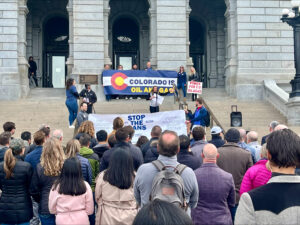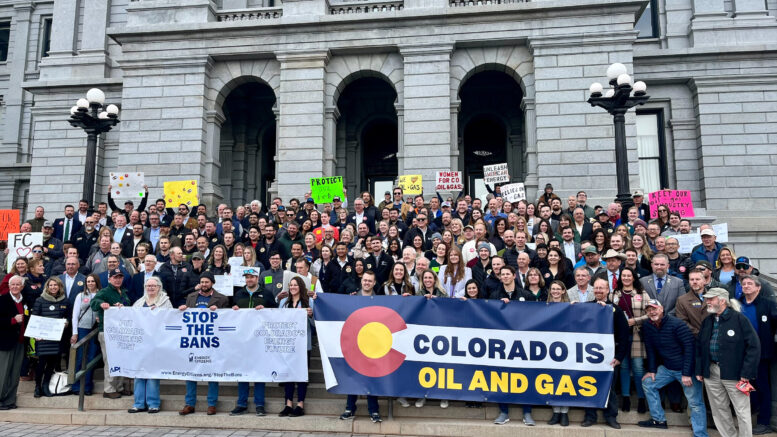A proposed ban on new oil-and-gas wells failed to make it out of its first legislative committee Thursday, dying after a nearly nine-hour hearing in which the bill was described as everything from the answer to an existential crisis to an “unprecedentedly punitive” idea.
Senate Bill 159, sponsored by Democratic Sens. Sonya Jaquez Lewis of Longmont and Kevin Priola of Henderson, is one of a half-dozen proposals this year that seek to boost air quality by limiting emissions from energy producers, manufacturers or other sources. But its impacts would have been the most sweeping, as it sought to ban issuance of new drilling permits beginning in 2030 and to retrospectively place financial responsibility for the cleanup of orphaned wells on previous owners if their current owners go bankrupt.
Critics from oil-and-gas leaders to local-government officials to business organizations argued that it would serve as de facto ban of a $48 billion statewide industry that would lead to massive layoffs and enormous holes in government and school-district budgets. A study from free-market research organization Common Sense Institute, who Priola criticized for having energy firms among its funders, argued that the bill would lead to the loss of 181,800 jobs in 10 years and the loss of $31 billion to $48 billion in state and local tax revenue over that time.
Supporters — including a swath of environmental organizations, students and individuals suffering from health conditions — said the economically focused discussions ignored the larger threat from climate change and the key role that oil and gas plays in that. Heidi Leathwood, climate policy analyst for 350 Colorado, said any adverse economic impacts would pale compared to avoiding public-health damages from oil and gas development, estimated by Colorado Fiscal Institute at $480 million to $1 billion annually.
Of public health and a healthy economy
But those arguments fell flat with the three Republicans and two of the four Democrats on the Senate Agriculture & Natural Resources Committee — Sens. Dylan Roberts of Frisco and Janice Marchman of Loveland — who said the bill could devastate education funding and local communities. Roberts also criticized sponsors’ pre-hearing acknowledgement that SB 159 was in many ways a messaging bill that they didn’t expect to pass, an approach that he said has “not allowed for serious problem-solving to happen.”
Sensing its likelihood of failure, Priola and Jaquez Lewis tried to salvage the bill by offering amendments after 11 p.m. that would have nixed the permitting ban and narrowed the bill only to foisting liability for orphaned wells upon previous owners. But Roberts and Marchman criticized that move as muddling a process in a way that lacked stake-holding.
And both oil-and-gas and general business groups heralded the defeat of the bill as a victory for the roughly 300,000 state workers employed directly and indirectly by an industry that is working to reduce emissions.
“The women and men of our industry find the as-drafted version of this bill to be unprecedentedly punitive, willfully shortsighted and plainly disrespectful to Colorado lawmakers and the public alike,” said Kait Schwartz, director of American Petroleum Institute Colorado. “There is no part of this bill that should survive tonight. And if it does, we believe the message it sends is that you are letting extreme special interests run this building.”

API Colorado Director Kait Schwartz speaks at a rally for oil and gas earlier this month at the Colorado Capitol.
Why the target on new oil-and-gas wells
With the northern Front Range in severe nonattainment of U.S. Environmental Protection Agency ozone limits, a legislative committee met through the offseason to discuss potential actions and produced three bills. But SB 159 was an outlier proposal with a bolder agenda — to stop the production of new wells in order to avert what Priola warned could be a mass extinction if governments don’t take drastic steps to limit the continued rise of global temperatures.
Leathwood, noting that eight countries have banned fossil-fuel development, called continued drilling an “existential threat to life on this planet.” Sandra Steingraber, a senior scientist with the Science and Environmental Health Network, said oil-and-gas extraction has created “human sacrifice zones” in which rates of cancer, heart problems and skin diseases all rise proportionately to proximity to wells, according to multiple studies.
“These are costs that were not captured in the fiscal note,” Priola said, alluding to an analysis from the nonpartisan Colorado Legislative Council predicting that the bill would reduce annual state revenues by $476 million within 10 years. “But these are real costs — insurance costs, costs of drought, costs of famine, costs of migration.”

Colorado state Sen. Kevin Priola talks about his air-quality bills in his Capitol office in February.
Also not included in the fiscal note, oil and gas leaders said, was the investment they have made into cleaner and less-polluting equipment already. Several referenced a report done by the Colorado Energy Office showing that the oil-and-gas sector has reduced emissions 60% versus a 2005 baseline so far — the largest cut of any major state sector.
Liability for former owners of oil-and-gas wells?
But activists don’t consider those contributions to pollution reduction, focusing instead on oil and gas to the exclusion of any other sector, argued Sen. Barbara Kirkmeyer, R-Brighton. And a collection of witnesses noted how much the new-well ban — which could knock out production quickly because most wells experience declining production after their first 18 months — could cut 73% of revenues in a place like Rio Blanco County and could halve the budgets in 15 different school districts.
Jaquez Lewis said an increase in liability for former well owners is needed because the state has 648 orphan wells for which it’s financially responsible and will see more coming as companies sell unproductive wells to shallow-pocketed firms that declare bankruptcy. Tagging one-time owners with liability will stop Colorado residents from having to pay for the capping and cleanup of these wells, especially as it now costs $92,700 per well for the state to take on this responsibility, she said.
But Julia Rhine, Colorado Oil & Gas Association counsel, said the bill would assign liability to former owners retrospectively, even after the Colorado Supreme Court has determined governing bodies can’t change the legal consequences of an act after the act has occurred. Those owners may have followed all applicable rules and still get hit later with significant bills, which is particularly unfair, Schwartz argued as well.
And so, SB 159 fell on a 5-2 vote just before midnight, with only its two sponsors backing it. Priola also tried to move the bill out of the committee to the Senate Transportation and Energy Committee, which is considered friendlier to environmental pleas, but that motion failed as well.
What comes next
The defeat of the drilling ban likely turns business leaders’ attentions even more now to the three bills that came out of the interim ozone committee and have each passed their first committees but are likely to face significant hurdles with House and Senate finance committees because of their price tags. SB 165 would pause pre-production activity like fracking between June and August, SB 166 would create a new repeat-violator designation that would be subject to heavy fines and House Bill 1330 would require extensive modeling and more limitations in consideration of issuing permits.
Opponents of SB 159 included Colorado Energy and Carbon Management Commission Director Julie Murphy, who argued that the number of active wells is declining because of existing regulations and that private companies are plugging almost all abandoned wells. Those opponents read from Gov. Jared Polis’ Greenhouse Gas Pollution Reduction Roadmap 2.0, which rejected a drilling ban because he said it would reduce production without reducing demand, heaping costs disproportionately onto low-income Coloradans.
“The longer this legislation exists, or the threat of this legislation exists, there are real economic impacts to Colorado, whether it’s revenue, the competitive landscape or jobs,” said Meghan Dollar, senior vice president of governmental relations for the Colorado Chamber of Commerce.
But opponents said the hearing was just the first battle in what they expect will become an escalating war against continued oil-and-gas drilling, and they vowed to return.
“To not support a transition away from oil and gas is not only wrong, it’s negligible,” said Patricia Garcia-Nelson, fossil fuel just transition advocate for GreenLatinos Colorado. “If we don’t win this one here, we’ll keep coming back, because we are not motivated by money, and you can’t stop that.”
